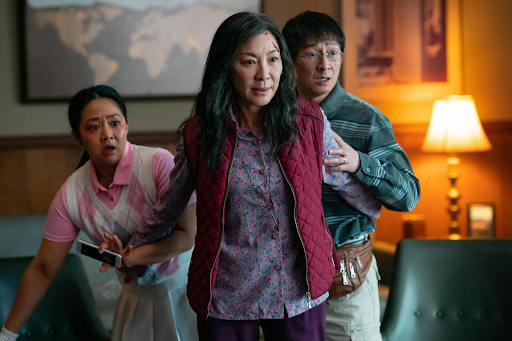Everyday Superheroes: Tokenism and Misrepresentation of Asian Pacific Islanders in Film
I grew up watching Michelle Yeoh. At ten years old, I saw her flip and twist through the air as Yu Shu Lien battled Jiao Long for the Green Destiny blade in Crouching Tiger, Hidden Dragon. At thirteen, I was entranced by her poised and intense portrayal of Mameha in Memoirs of a Geisha. To many western audiences, Yeoh was a breakout star in Crazy Rich Asians and Shang-Chi. But for me, a young Asian American girl, Yeoh was already a legend.
And so, it’s no surprise that she’s receiving overwhelming acclaim on her most recent film, Everything Everywhere All at Once.
Of taking on this film, Yeoh tells GQ, “When I read the script, I thought, ‘This is something.’ This is something I’ve been waiting for for a long time. That’s going to give me the opportunity to show my fans, my family, my audience, what I’m capable of. To be funny, to be real, to be sad. Finally, somebody understood that I can do all these things.”
Yeoh’s words are telling. Hollywood lacks representation—not only in sheer numbers, but in the industry’s refusal to acknowledge the various Asian actors and the variety of roles they are capable of beyond those in which they are stereotypically cast.
In a 2021 study by the USC Annenberg Inclusion Initiative on “The Prevalence and Portrayal of Asian and Pacific Islanders across 1,300 Popular Films,” it was found that “Of the 1,300 top films from 2007-2019… 44 films depicted an API Lead or Co Lead” and, most ironically, of these 44 films with API leads, “14 were Dwayne Johnson.”
Furthermore, the study found that among these films, “75% of API characters were silenced, speaking 5 lines or less of dialogue,” 67% were stereotyped to “reflect tired tropes,” and 30% were tokenized/isolated as the “only one in the film or their scene.”
How does Hollywood expect us to celebrate its ‘inclusivity’ when its limited and cliched roles seem a meager attempt to check the diversity box? The film industry hides behind a veil of tokenism, barring it from the ‘true’ diversity that it preaches.
Though blockbuster films such as Crazy Rich Asians and Shang-Chi act as a powerful catalyst for opening more API roles in the future, they reinforce a glamourized, romanticized illustration of Asian culture that is unachievable for most.
Rather, it’s up and coming films like Minari and Everything Everywhere All at Once that give us a sincere depiction of what being API truly means.
In regards to Everything Everywhere All at Once, Yeoh says, “I was really blown away by the fact that the superhero was this ordinary aging Asian immigrant woman. I hadn’t read a script like that… I was so impressed by the fact that they are giving such a voice to this woman. I mean we pass this mother, auntie, grandmother going to the supermarket or in Chinatown every day and we would never notice them… so, it was wonderful that I had the opportunity to give this woman a loud voice right and let her be a superhero.”
Let’s continue to do better. Let’s encourage Hollywood to continue showcasing the previously overlooked complexities of our everyday API superheroes.

